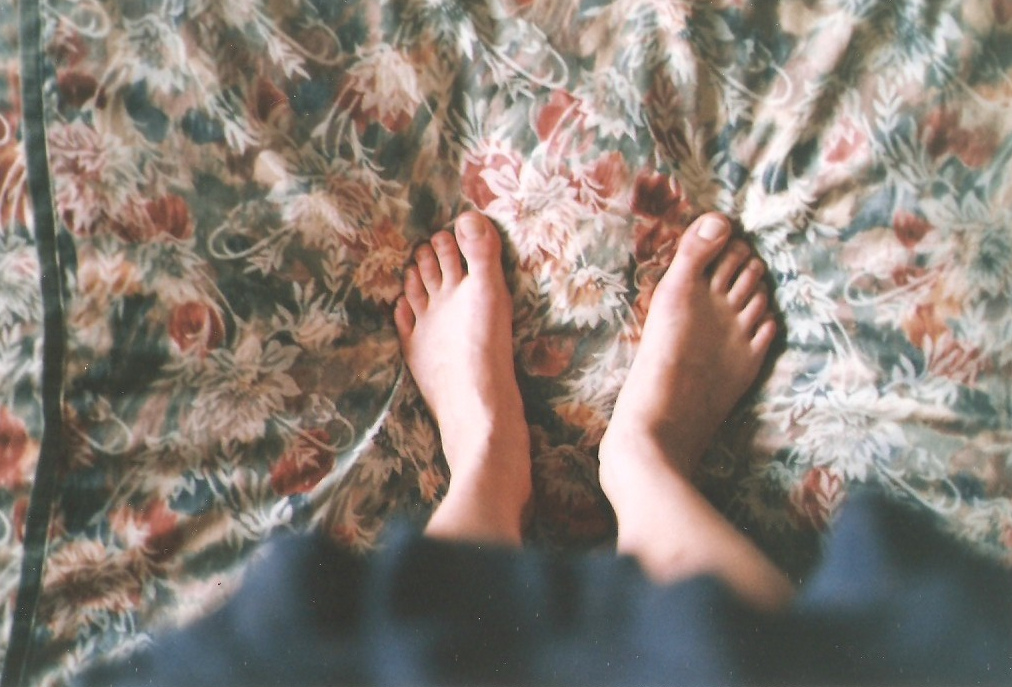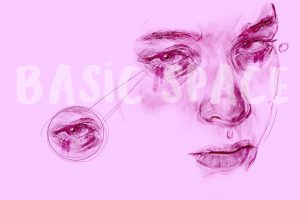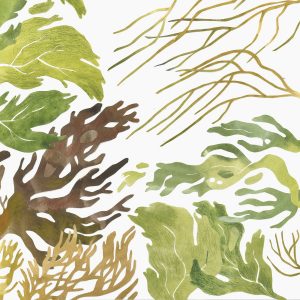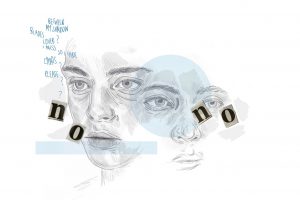
Afterimage
by Samantha Patrick | June 13, 2015
The bedroom seemed lighter than usual, much to her annoyance. It was past two in the morning, full dark, and the only light in the room was that which seeped through the gaps in the curtains from the streetlamp outside the window. Adam hated those chinks of light, always reminded her to switch to blinds, and she always politely ignored him. She regretted it now. The fever and the pain in her head made it seem like the whole room was swarming with insects; there was a low, insidious whine in her ears, and the patches of darkness in the room seemed strangely animate. She could see flickers and pulses in the shadows, like television static or small black flies. Irritated, she rubbed her face on her pillow to wipe away the sweat gathering on her forehead. Adam shifted next to her, then rolled onto his left side, his back to her. He didn’t say anything, but she knew he was awake. He shouldn’t be, wouldn’t want to be; he had to be at his internship by eight the next morning, and neither Adam nor his superiors would consider a sick girlfriend to be a reasonable excuse for not being up to form. She knew that. She also knew that talking to him would not make her feel any better. Still. Her voice hissed out a schoolroom whisper, with a schoolgirl question: “Adam? Are you awake?”
His sigh rustled across the sheets and he turned to face her. “Yes,” he said, expectantly. Even in the hazy gloom, she could make out his features clearly. Cheekbones you could cut yourself on, a friend had said when Sarah first introduced him, and she’d rolled her eyes, secretly pleased. He had green eyes too, and a gleaming white smile. They were the kind of good looks that stick to your teeth, and she was beginning to resent him for it. It was uncanny, it jarred somehow. It was a little too perfect perhaps. She would never tell him that, of course. He wouldn’t understand what she meant anyway. He ironed his jeans.
She’d glazed over without answering him, and there was an edge of impatience to his voice when he cleared his throat. “Sarah? Can I get you anything?” He asked. “Some water?” She shook her head. He paused for a moment, then rolled over. “Jesus. It’s like a furnace in here.”
You bastard, she thought. This is your fault too, and you know it. But she said nothing, instead swaddling herself more tightly in the duvet. She could sense heat radiating from her body, but she was shivering. Her skin felt too thin. She imagined it translucent, permeable, exposing a livid network of veins and capillaries like a train map. Despite her exhaustion, she couldn’t sleep – her brain whirred with a febrile intensity. Her eyes skittered over the floor of her room, the room that had become half his over the last five months. A packet of paracetamol, an empty can of diet coke he’d attempted to throw into the bin and missed. An expensive fountain pen, hers, lay carelessly discarded in the corner. It was a waste buying such an expensive pen, as he’d often pointed out to her; she broke them constantly, pressed the nib too hard on the paper when she was trying to concentrate, or left them lying on the floor where she would accidentally step on them and crack the casing, sometimes leaving ink stains on the carpet. Rolled up by the foot of the bed were a pair of white socks, his – she had always privately thought white socks a little pathetic on anyone over the age of ten, but Adam wore them religiously. Probably because he used to play cricket (of course), and it had become a habit for him. Like so many other things.
She kicked off the covers, suddenly feeling as though she was suffocating. A fresh sheen of perspiration broke over her brow. Adam rose again and propped himself on one elbow, surveying her. She knew she looked awful. Her eyes were blurry and bloodshot, and her hair lay damp and matted like strands of seaweed. He pressed his hand to her forehead for a brief moment; it was cool and comforting.
“Remember the last time you were sick? That time at the beach.”
Yes. A weekend trip, a couple of months after they’d become official. They’d liked the pier. She’d clambered up on the railings and walked along the uppermost bar, like a child pretending to walk a tightrope. He’d held her hand, a little incredulously, to balance her. She thought about mentioning it, but he wouldn’t remember.
He went on: “We stayed at that godawful place. Remember? Bed and breakfast, minus the breakfast, which is just blatant false advertising. But the pier was good.” A pause. “We bought candy floss. And then later I wanted fish and chips, and you said—”
She’d said that eating fish and chips was a dismal experience unless you ate them wrapped in newspaper, like in the old days.
“—so we bought a newspaper and wrapped them in that and went down to eat them on the beach. And it was freezing, so I wore your hat and looked like a complete twat.”
She’d forgotten about that; it had been a green knitted cap with sequinned flowers. She’d dissolved into giggles, and he’d scowled from beneath the ridiculous hat and pelted chips at her. She’d developed a terrible cold the next day, but she’d almost thought it was worth it. Sitting on the shingle, covered in grease and ink smears, wind-bitten but laughing, leaving black handprints on each other’s faces.
Adam had laid back down now, still speaking but the sound had flattened out into a drone: pebbles and hydrological, a strange word but she couldn’t follow, her mind was full of the shrieks of seagulls and all at once everything, Adams’s voice and the rasp of her breath and the whine inside her skull was all too loud. “Bit of a disaster,” Adam said and she thought of flashing lights from the pier and the chip fat coating her tongue and she leant over and vomited into the bin placed beside the bed.
Adam was sitting up beside her in an instant, holding back her sweat-soaked hair with one hand and massaging her upper back in slow circular motions with the other. It helped. He would have been good at this part, she thought, and the thought made her retch again with an unpleasant splattering noise. The floor had ceased to be solid, it swelled towards her like the waves of an ocean, and she heaved and shook. He held her steady.
“I hate this,” she gasped when she was sure she wasn’t going to be sick again. Her eyes burned. “I hate this.”
“I know,” he said. His voice was even, but she could tell that he was worried. They’d known each other long enough for that. “The side effects – they said at the clinic it shouldn’t last much longer.” She wheezed by way of acknowledgement, lolling bonelessly over the edge of the bed. He let go of her and flipped onto his back. She didn’t need to look at him to know he was glaring at the ceiling.
“It wasn’t supposed to be like this.” To her surprise, his voice was soft, half-pleading. “It was supposed to be simple.”
She made no reply. Complications were always her thing. Adam had never understood them, and they didn’t suit him. They lay in silence while Sarah drew in long, shuddering breaths. Her belly felt empty, almost hollow, and she didn’t think it was just the vomiting. A spasm of something like regret flashed through her for a moment, but it felt oddly disembodied; she shut her eyes and waited for it to pass. It was like a phantom pain from a limb lost long ago, something that didn’t really belong to her.
Abruptly, she curled into him, burrowing under his left arm and burying her face in his shoulder, craving his solidity. Too late, she remembered that she probably still had sick smeared around her mouth, and that Adam was notoriously squeamish. It didn’t matter. He looped his arm around her, twining her hair through his fingers and nestling her to his chest. She loved him then, a little.
“We couldn’t have—” his throat was dry. He started again. “It wouldn’t have worked.” The words tumbled out brittle and sharp, and the air thickened uncomfortably. There was something chillingly inorganic in them, something that made her think of the smell of disinfectant, and for a split second she almost recoiled. But she’d heard the way he’d struggled to fit his mouth around the words. She nodded against his collarbone.
Of course it wouldn’t have worked, she thought. It couldn’t have, not with you, you iron your jeans. Obscenely, a noise bubbled in her throat, a giggle or a sob, she couldn’t tell which. She swallowed it with difficulty.
In a few weeks, she knew, his socks would have been picked up from her floor for the final time. In a few months, he’d have forgotten his annoyance about her curtains and all her complications. As she peered up at his face, so very handsome and so carefully blank that she almost didn’t notice his lower lip trembling, she realised he knew it too. Soon they’d begin to heal over each other, surfacing over old memories like flesh sealing over a splinter. For now, though, they held each other quietly, listening to the thrum of the other’s heartbeat in the half-light.




